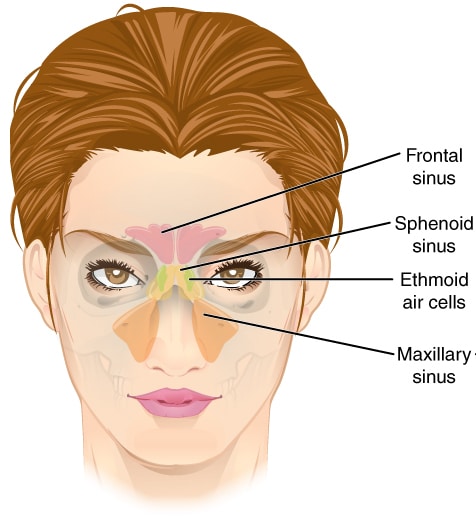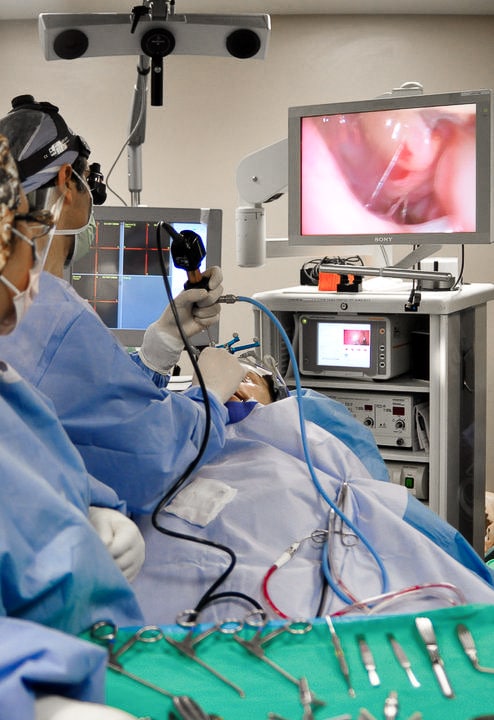Endoscopic Sinus Surgery – Overview
Endoscopic Sinus Surgery is a surgical procedure that involves the opening of the passages of the paranasal sinuses to allow for proper drainage of the nose using a nasal endoscope. The paranasal sinuses are a group of four air-filled spaces that the nasal cavity.
The sinuses may become infected resulting in a disease state known as sinusitis. Some symptoms of sinusitis include facial pain, plugged nose, insomnia, etc.
Endoscopic sinus surgery is generally carried out as a form of treatment for chronic rhinosinusitis, nasal polyps and some cancers. Surgical intervention is usually considered after other treatment options such as antibiotics medications have been exhausted.

Paranasal Sinuses
Reasons for Endoscopic Sinus Surgery
Endoscopic sinus surgery is most commonly used to treat chronic rhinosinusitis.
Chronic rhinosinusitis (CRS) is an inflammatory condition in which the nose and at least one sinus become swollen and interfere with mucus drainage. It can be caused by infections as well as anatomical factors such as a deviated septum or nasal polyps (growths).
Symptoms include difficulty breathing through the nose, swelling and pain around the nose and eyes, postnasal drainage down the throat, and difficulty sleeping. CRS is a common condition in pediatric patients and young adults.
The main goals of sinus surgery are to relieve your symptoms and cut down on how many infections you get. If they keep coming back, chances are there’s something in your nasal cavity that surgery could fix.
An operation should also help you breathe better through your nose. And if the problem has affected your sense of smell or taste, surgery might help with that, too.
Related: Hair Transplant Surgery
Surgical Procedure for Endoscopic Sinus Surgery
Endoscopic sinus surgery can be performed under local anesthesia as an outpatient procedure. Generally, you will experience only minimal discomfort during and after the surgery. The procedure usually takes between one and three hours to complete.
During the procedure, the surgeon removes the uncinate process of the ethmoid bone while visualizing the nasal passage using a fiberoptic microscope. When inside the nose, the surgeon removes any anatomical obstructions that prevent proper mucosal drainage.

Endoscopic sinus surgery
Endoscopic Sinus Surgery Risks and Complications
Like any surgical procedure, there are risks and complications associated with endoscopic sinus surgery. Some of the risks include:
– Cerebrospinal fluid leak: This involves leakage of the fluid out of their compartments. CSFL is the most common complication of the procedure which has been observed in about 0.2% of patients. Generally, CSFL arises during surgery and can be repaired with no additional related complications postoperatively.
– Infection
– Bleeding
– Numbness of the front teeth
– Orbital hematoma
– A decreased sense of smell
– Blindness: Although very rare, blindness may result from the procedure due to damage to the optic nerve.
Endoscopic Sinus Surgery Success Rates
The procedure is considered a success if most of the symptoms, including nasal obstruction, sleep quality, olfaction and facial pain, are resolved after a 1-2 month postoperative healing period.
Reviews of endoscopic sinus surgery as a method for treating chronic rhinosinusitis have shown that a majority of patients report increased quality of life after undergoing surgery. The success rate of the procedure in treating adults with CRS has been reported as 80-90%, and the success rate in treating children with CRS has been reported as 86-97%.
Endoscopic Sinus Surgery Cost
The total cost for endoscopic sinus surgery depends on a lot of factors such as the anesthetic fee, private hospital fee, private operating facility fee, the extent of surgery required. The total cost of the procedure is around $5,000 – $11,500.
Endoscopic Sinus Surgery Recovery
Recovery may take about 3 to 5 days. Take your prescribed medications and avoid any strenuous activities until cleared to do so by the surgeon.
Follow-up care is critical for recovery; keep all appointments and follow instructions regarding removing nasal packing and especially instructions on nasal irrigation (many surgeons request patients to remain in the area for 3 weeks after surgery in case any problems develop).